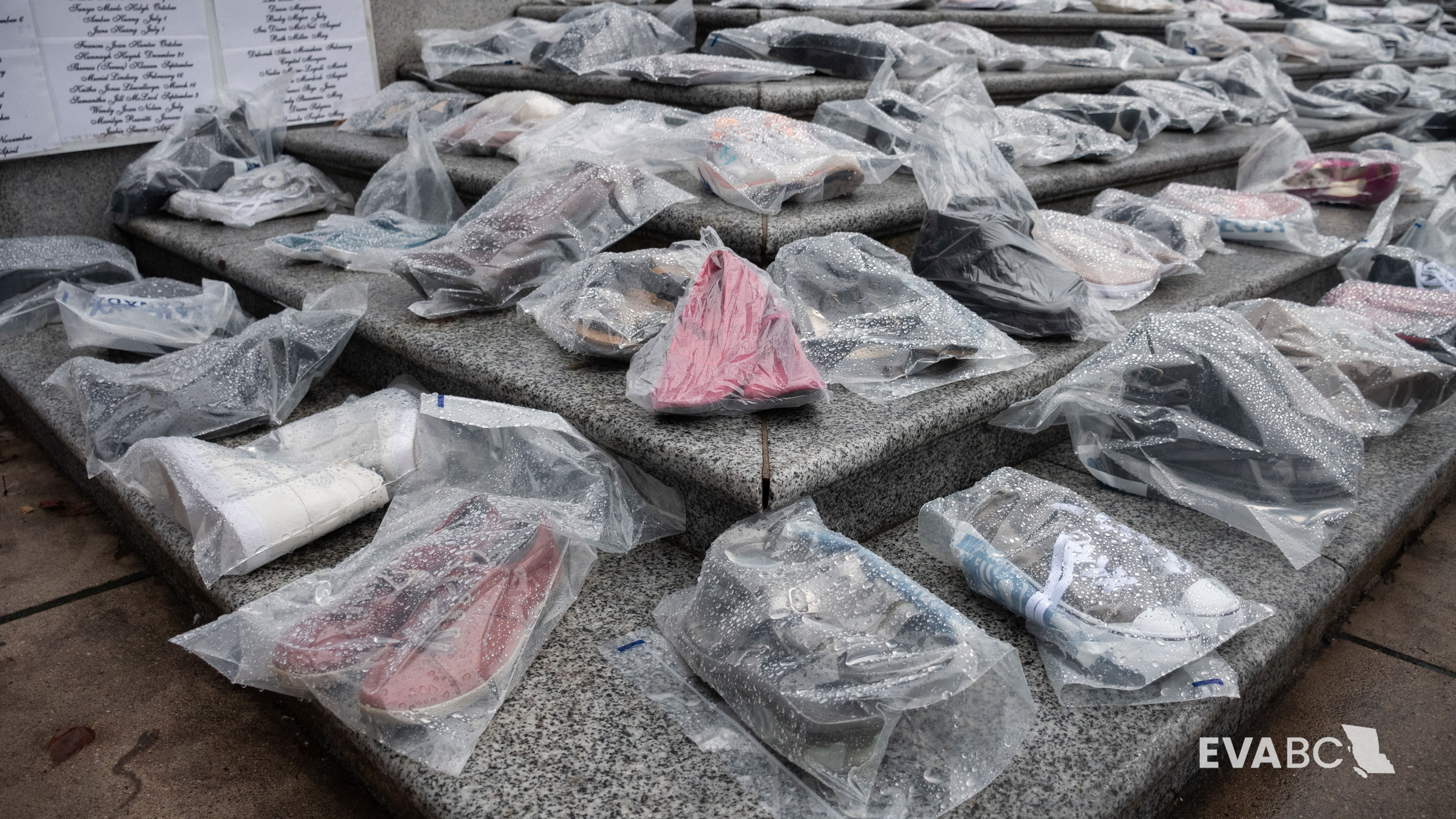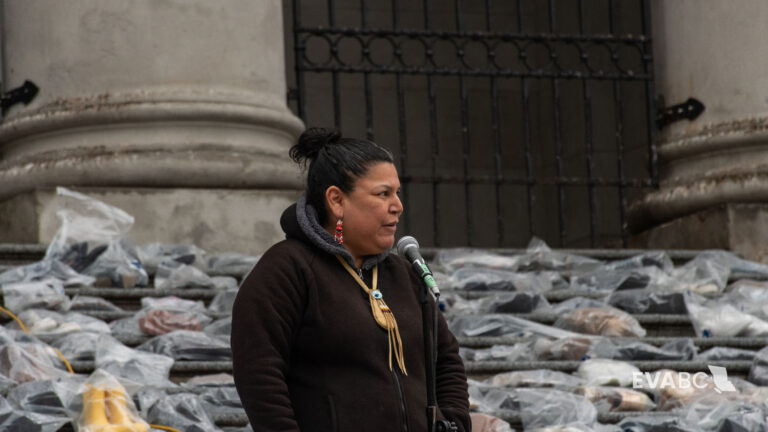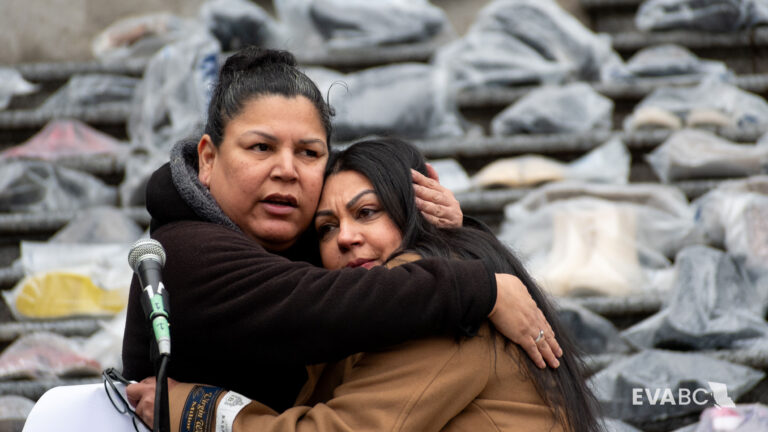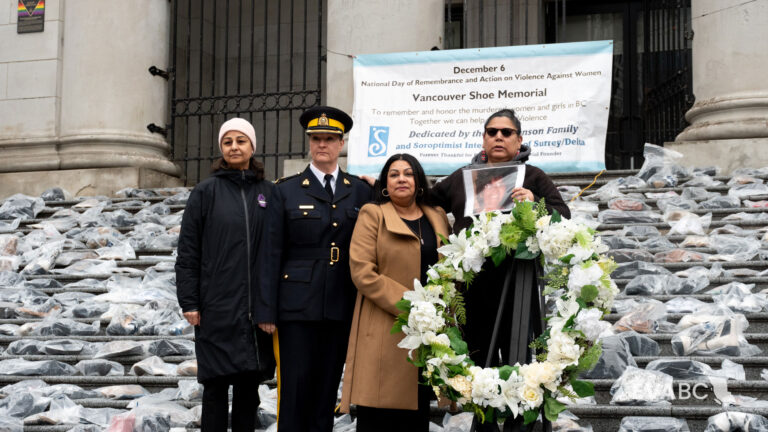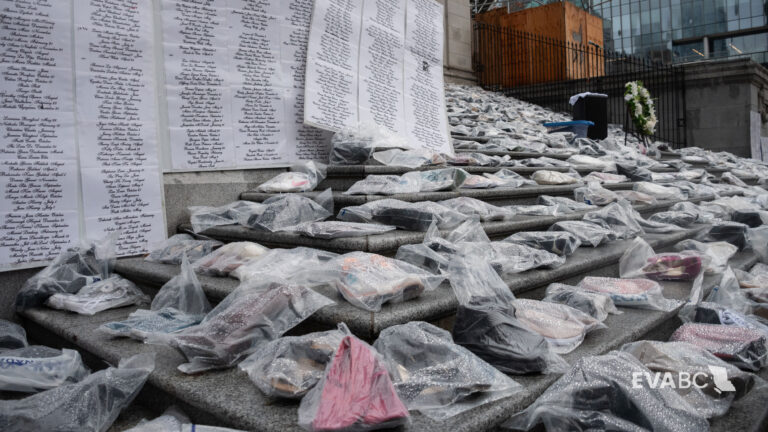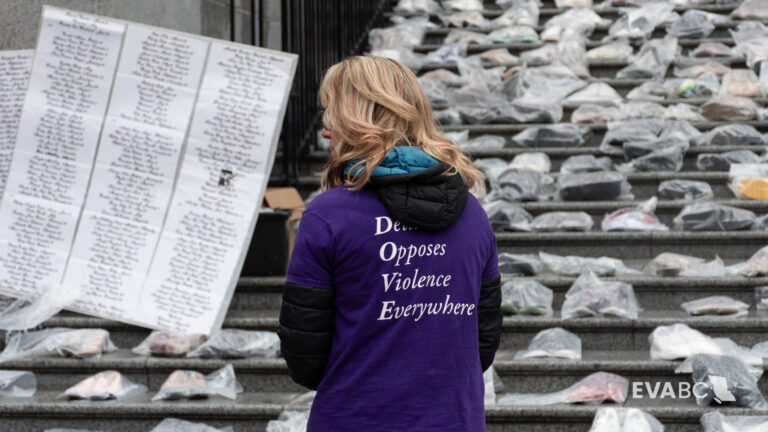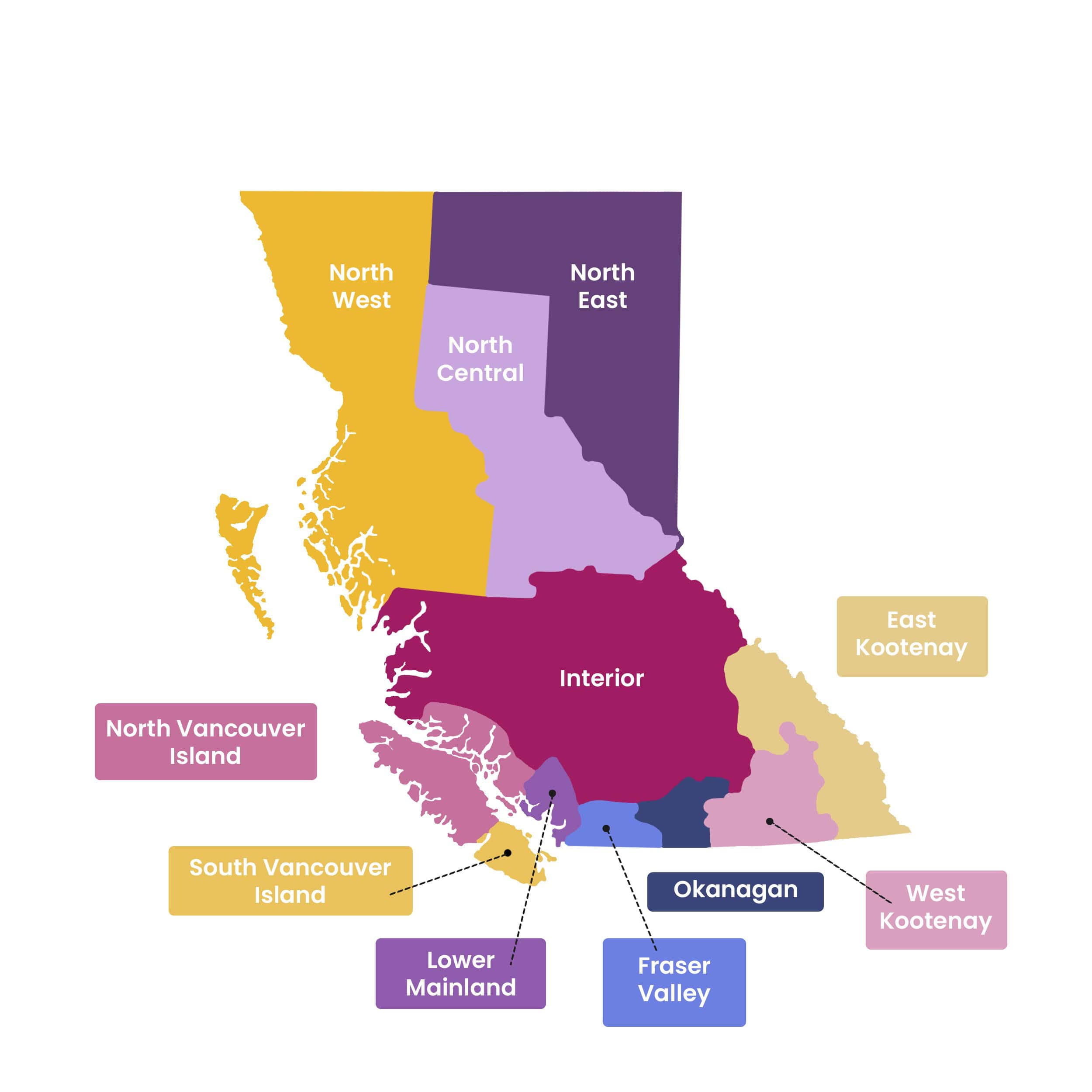On December 6, the United Food and Commercial Workers Local 247 (UFCW 247) hosted their 19th annual National Day of Remembrance and Action on Violence Against Women Shoe Memorial at the Vancouver Art Gallery.
The National Day honours and remembers the 14 women who were killed in an act of hatred at the Ecole Polytechnique in Montreal on this date in 1989. December 6 is one of the key dates in the 16 Days of Activism Against Gender-Based Violence that began on November 25 and ends on December 10.
Speakers spoke on the steps of the art gallery on Robson Street surrounded by a display of shoes and boots, packaged in clear plastic, representing all the women who have lost their lives to gender-based violence.
Melanie Kirkland, from Simpcw First Nation whose mother Thelma was murdered 19 years ago on December 2, spoke about her connection to the event. Melanie had lost touch with her mother and only learned of her death when she found her name listed online as part of the Shoe Memorial in 2015.
“Violence is so, so, so alive still,” Melanie said to the people who had gathered in front of the steps or were walking past. She recounted how the two men found guilty of killing her mother were both acquitted; of how a man found guilty in a more recent murder of a woman she knew still waits in jail without being charged for that crime. At the same time, she thinks of a young man she knows who, while addicted to drugs, shot at a Caucasian RCMP officer and within a week was charged and sentenced.
“I stand firm that justice has not changed in the 19 years since my mother was murdered,” she said. She went on to ask the crowd, “Please listen with your ears to everyone you come in contact with, man or woman. If they share a story with you it is important to talk to them and let them know you’re hearing them, because we just don’t know who is being affected by the violence in our lives.”
Jasmine Bhambra, local realtor and community volunteer, is the sister of Manjit Panghali, the school teacher and mother who was murdered by her husband in 2006 while pregnant with their second child. Bhambra told of the difficult six-year murder trial she and her family endured before they got a conviction. Now her sister’s husband is out on parole. She spoke with passion about the work she continues to do to try to change the entrenched societal values that continue to perpetuate dangerous stereotypes about women and continued violence.
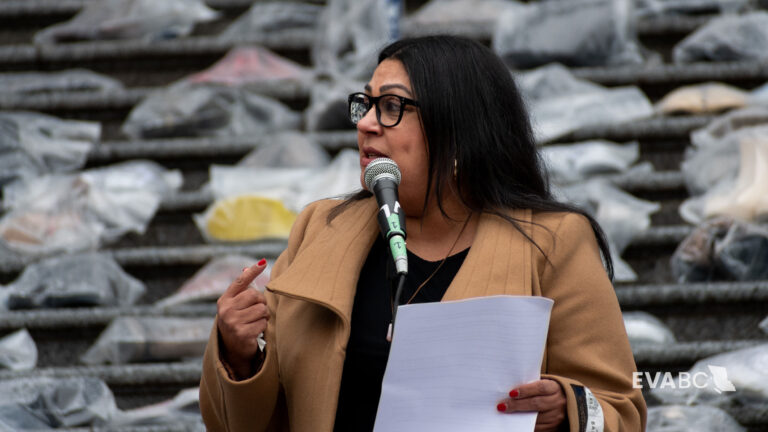
Jasmine Bhambra, local realtor, community volunteer and speaker, and sister of Manjit Panghali.
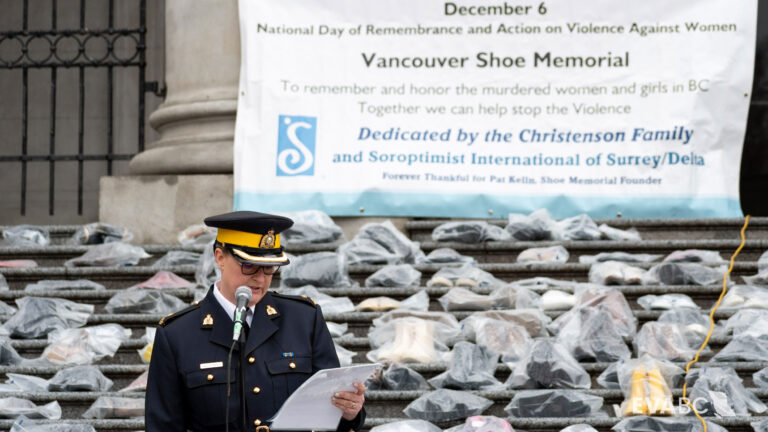
RCMP Inspector Raina Siou, leader of BC's Community Policing Services programs.
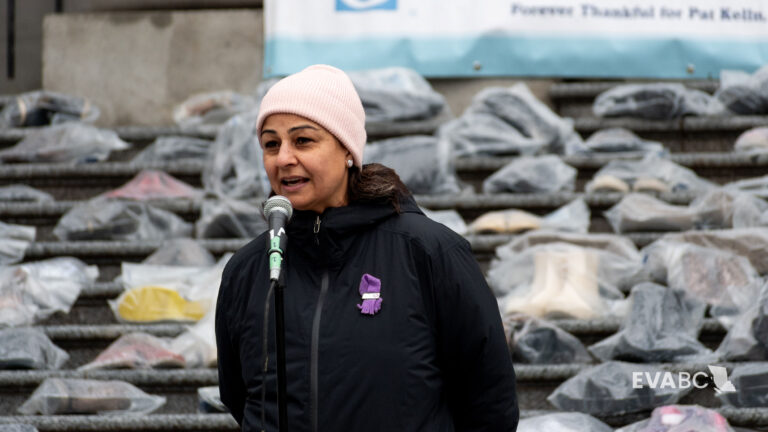
Ninu Kang, Executive Director of the Ending Violence Association of BC (EVA BC).
Inspector Raina Siou of the RCMP, leader of BC’s Community Policing Services programs which includes Victim Services, Intimate Partner Violence and Sexual Assault, (as well as many other programs), shared her work to make change and ensure officers are educated and bring a trauma-informed approach to their work with survivors of gender-based violence and to work in the community and across sectors to track and prevent worst-case outcomes.
EVA BC’s executive director, Ninu Kang, spoke last and asked us to not lose sight of continued gender-based violence. “We must not take our eyes off of gender-based violence and crimes because we know that this is a hidden pandemic.”
She reflected back to the massacre in 1989 and “the level of hate and backlash that women were receiving at that time, especially those of us who were identifying as advocates fighting for gender equality.”
She shared that, in spite of all the work done since then to end gender-based violence, gender-related homicide of women and girls in Canada is on the rise, especially since the pandemic.
She shared the Canadian Femicide Observatory’s call for an amendment to the Criminal Code of Canada to recognize femicide as a separate category in the Code. And she emphasized the Calls for Justice from the Missing and Murdered Indigenous Women, Girls, and 2SLGBTQQIA+ People national inquiry.
She noted that the Government of Canada has rolled out its National Action Plan to End Gender-Based Violence and that it includes a pillar called Implementing Indigenous-led approaches.
She noted that the Province of BC will roll out its action plan soon and emphasized EVA BC’s commitment to work alongside government and community partners to implement the key priorities and monitor the ongoing progress of these plans.
Responding to what the other speakers shared she addressed the need to “provide early education to boys and men, better laws and longer sentences for repeat offenders.” She noted that “we have heard from male perpetrators that one of the key reasons they continued the violence and did not stop was because they got away with it.”
She closed with an acknowledgement of “the thousands of frontline anti-violence workers across BC who continue to support survivors of gender-based violence everyday in our communities across BC with knowledge, empathy, compassion and commitment.”

